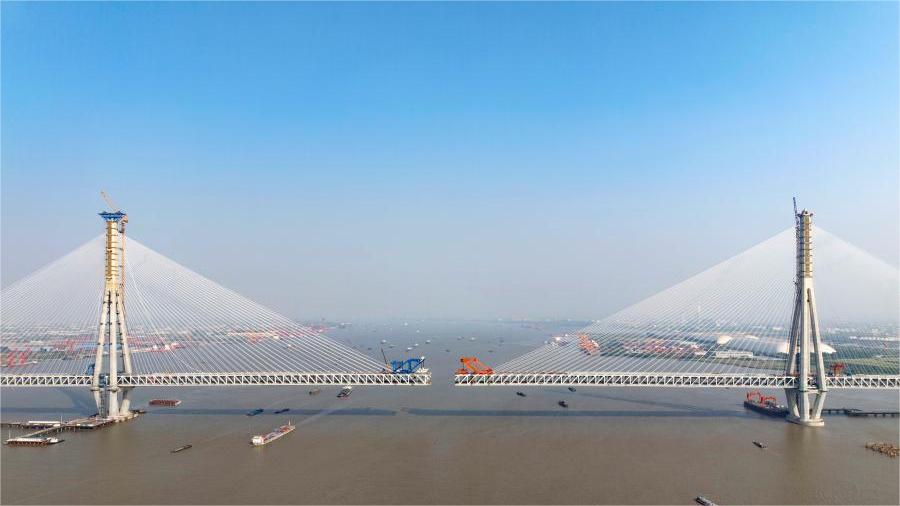Feature: Journey of durians from Thai orchards to Chinese markets
CHANTHABURI, Thailand, May 14 (Xinhua) -- A worker stood atop a durian tree and cut the fruit with a knife, while his colleague caught the durian firmly with a sack under the tree. With the durian harvest season starting in eastern Thailand, farmers are busy organizing workers to cut durians off.
Sasitorn, owner of a durian orchard, has been in the business for over 10 years. Located in Thailand's Chanthaburi province, Sasitorn's orchard has more than 2,000 durian trees.
Chanthaburi province, about 250 km away from the capital Bangkok, is an important durian planting area in eastern Thailand.
"It is the harvest season for durians and I have hired more than 40 workers to cut durians every day," said Sasitorn. She added that the durian production has decreased this year due to drought, but the demand in Chinese market is large.
"We supply multiple varieties of durian, including kradum, which matures earlier, and Monthong, which is popular among Chinese people," she said.
The durians picked at Sasitorn's orchard were quickly transported to a nearby processing factory. Filled with fresh durians in the processing factory, dozens of workers are busy sorting, weighing, packaging and loading the durians.
Virachai, manager of the processing plant, told Xinhua that China is a very important market for them and currently all the durians from their factory are exported to China.
"Our factory has exported 23 containers to China so far this year," said Virachai, adding that the durians mainly exported through three methods, of which air transportation accounts for 20 percent, sea transportation accounts for 40 percent, and land transportation accounts for 40 percent.
Thailand is one of the world's major durian producers and exporters. According to the data from China's General Administration of Customs, China's fresh durian import in 2023 was 1.426 million tons, of which Thai fresh durians were 929,000 tons, accounting for 65.15 percent of China's total fresh durian imports.
Limited by transportation and warehousing conditions, tropical fruits produced in the Association of Southeast Asian Nations (ASEAN) used to be difficult to enter the Chinese market due to its short shelf life.
With the deepening of the construction of the China-ASEAN Free Trade Area, the effect of Regional Comprehensive Economic Partnership (RCEP) and a number of interconnection projects such as the New Western Land-Sea Corridor as well as the rapid development of cross-border cold chain logistics systems and e-commerce, durians and other fruits from ASEAN can be transported into Chinese market more efficiently and conveniently.
Youyi Port is a land border port with Vietnam in Pingxiang, South China's Guangxi Zhuang Autonomous Region. In 2023, China imported 282,000 tons of Thai durians through Youyi Port, a year-on-year increase of 162.4 percent. In the first quarter of this year, China imported 48,000 tons of fresh durians through Youyi Port and among them, 13,000 tons of fresh durians were imported from Thailand.
The prosperous import and export trade benefits from the tariff-free policies and improvement of customs clearance efficiency. Huang Feifei, a customs officer from Youyi Port, said the customs department has continuously upgraded intelligent supervision facilities, deepened the construction of special channels for imported durians, and implemented a series of customs clearance facilitation measures such as green channels for imported fruits to ensure that imported fruits can be passed quickly.
Located in Nanning, capital of south China's Guangxi Zhuang Autonomous Region, the Haijixing Market, hailed as the largest wholesale fruit market of Guangxi, thrived with an animated atmosphere as people were unloading truckloads of durians from Thailand.
Mo Jiaming, a fruit dealer in Nanning, has been shipping about 50 tons of durians from Thailand to Haijixing Market every day. The fresh durians attracted many dealers and would be sold to the domestic market through various channels such as large supermarkets, fruit retail stores, and e-commerce platforms.
"Since this year, we have imported approximately 1,800 tons of durian. Thanks to the facilitation of customs clearance and cold chain preservation technology, the durians from Thai orchards can be transported to our domestic market as fast as three to five days," said Mo, adding there are more transportation options to import durians, which can be transported by road, sea, air and rail.
Mo has been engaged in the durian import trade for six years and believes that China's durian market still has huge potential.
"As China-ASEAN economic and trade cooperation continues to deepen, the consumer market continues to rebound and improve. With a series of favorable policies and measures, I believe that durian and other fruits from ASEAN will have a broader prospect in the Chinese market in the future," said Mo.
Photos
Related Stories
Copyright © 2024 People's Daily Online. All Rights Reserved.









